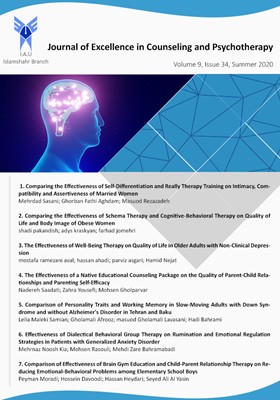-
-
List of Articles
-
Open Access Article
1 - Comparing the Effectiveness of Self-Differentiation and Really Therapy Training on Intimacy, Compatibility and Assertiveness of Married Women
Mehrdad Sasani Ghorban Fathi Aghdam Masuod Rezazadeh -
Open Access Article
2 - Comparing the Effectiveness of Schema Therapy and Cognitive-Behavioral Therapy on Quality of Life and Body Image of Obese Women
shadi pakandish adys kraskyan farhad jomehri -
Open Access Article
3 - The Effectiveness of Well-Being Therapy on Quality of Life in Older Adults with Non-Clinical Depression
mostafa ramezani aval hassan ahadi parviz asgari Hamid Nejat -
Open Access Article
4 - The Effectiveness of a Native Educational Counseling Package on the Quality of Parent-Child Relationships and Parenting Self-Efficacy
Nadereh Saadati Zahra Yousefi Mohsen Gholparvar -
Open Access Article
5 - Comparison of Personality Traits and Working Memory in Slow-Moving Adults with Down Syndrome and without Alzheimer's Disorder in Tehran and Baku
Leila Maleki Samian Gholamali Afrooz masuod Gholamali Lavasani Hadi Bahrami -
Open Access Article
6 - Effectiveness of Dialectical Behavioral Group Therapy on Rumination and Emotional Regulation Strategies in Patients with Generalized Anxiety Disorder
Mehrnaz Noosh Kia Mohsen Rasouli Mehdi Zare Bahramabadi -
Open Access Article
7 - Comparison of Effectiveness of Brain Gym Education and Child-Parent Relationship Therapy on Reducing Emotional-Behavioral Problems among Elementary School Boys
Peyman Moradi Hossein Davoodi Hassan Heydari Seyed Ali Al Yasin
-
The rights to this website are owned by the Raimag Press Management System.
Copyright © 2021-2025







